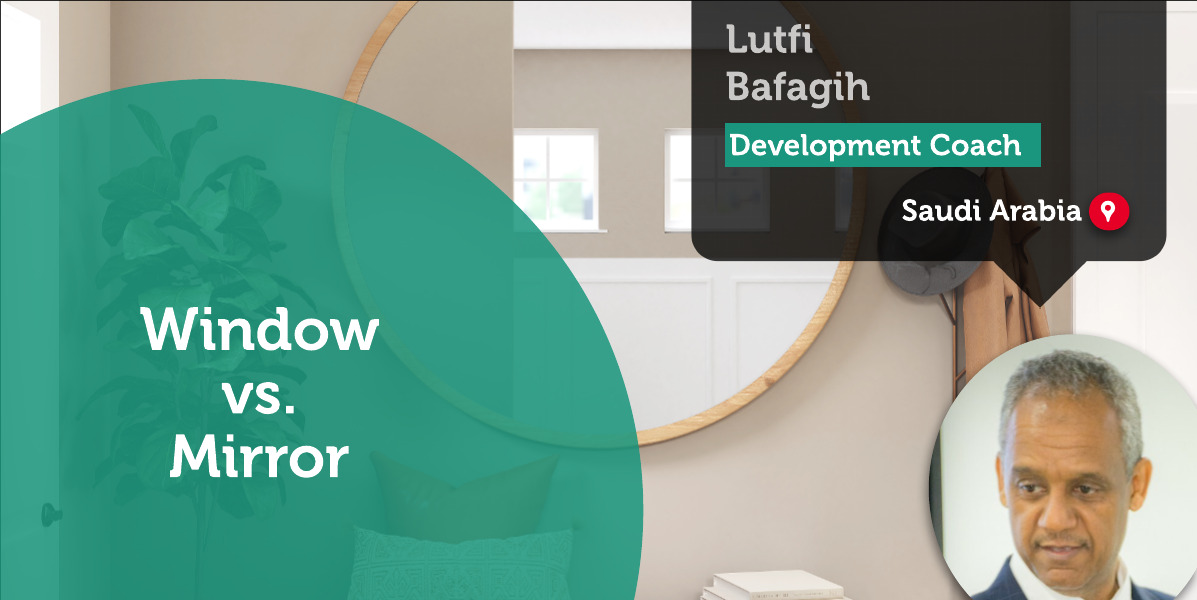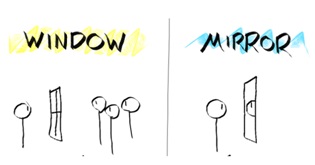A Coaching Power Tool By Lutfi Bafagih, Development Coach, SAUDI ARABIA

The Importance of Window vs. Mirror Concept
 The concept of “mirrors and windows” was initially introduced by Emily Style for the National Seed Project. The window represents a mindset that provides us with a view of the influence someone or something in our environment may have on our lives. Conversely, the mirror represents a mindset that provides us with a view of our ability to influence and take control of our lives.
The concept of “mirrors and windows” was initially introduced by Emily Style for the National Seed Project. The window represents a mindset that provides us with a view of the influence someone or something in our environment may have on our lives. Conversely, the mirror represents a mindset that provides us with a view of our ability to influence and take control of our lives.
The aim of the window-mirror concept is not to deny the existence of external factors that influence our lives and ignore our surroundings and the people we live and interact with. This concept aims to empower ourselves with the belief that it is up to us to take responsibility to address the challenges we face and learn from our experiences.
Window vs. Mirror Concept
Looking Through the Window
When you ask someone “what needs to happen for things to change for the better?” many people would look out (through the window) to identify someone or something out there to justify the requirement for a change to happen.
While there may be many factors outside of us (looking through the window) that could impede our development and growth, we have little control over these outside factors. When we wait for external factors to work in our favor and support our prospects for change, we limit our chances for success. Progress is often slow and may even not come, and in many cases, external factors may even work against our progress. This results in a feeling of despair and helplessness. We feel that it is not up to us to change, develop and grow, but rather, it is up to someone or something else to drive our growth.
- Looking outwards(through the window) leads us to throw the blame on someone or something.
- Looking outwards (through the window)cause us to feel helpless and disempowered to act.
- Looking outwards (through the window)causes us to react rather than respond.
- Looking outwards (through the window) causes us to focus on barriers only.
Looking Into the Mirror
When we look inward (looking into the mirror) within ourselves to identify something that will create change and lead to development and success we feel in control because we only control what is within us, our actions, thoughts, and feelings. When we look into the mirror, we can take action to move forward we feel empowered to keep trying to achieve our goals and reach our fullest potential. By looking into the mirror, we can multiply our chances for change, development, and growth. According to the Girls Lead website, self-empowerment can only occur when we know ourselves. Empowerment starts by looking inward to know our strengths and weaknesses. Self-awareness enables us to capitalize on our strengths and seek alternatives in areas where we are weak. Self-aware people can make decisions to enhance their lives using their strengths and despite their weaknesses. Self-aware people communicate their weaknesses confidently because they equally see their strengths, they see themselves as a whole (strengths and weaknesses), and know that they have what it takes to succeed.
- Looking inwards(into the mirror) helps us know our strengths.
- Looking inwards (into the mirror)helps seek alternatives for our weaknesses
- Looking inwards(into the mirror) helps us understand how we are likely to respond to situations.
- Looking inwards(into the mirror) enables us to build on our strengths.
Windows provide us with valuable lessons. Through observing others, and listening to other experiences we gain the knowledge required to drive change and create development. But only by looking into the mirror, we can apply the lessons we learn. Lessons come from the window, while change and development can be found by looking into the mirror. Change, development, and growth is a two-step process:
- First, we look through the window to find the models for change and growth that we seek. If we look hard enough, we will find the answers to our questions. We will discover that someone out there has achieved what we are trying to achieve. We learn from others’ experiences.
- Second, we need to look into the mirror to understand how such learning and experiences apply to us. What we are doing or not doing is impeding our growth. We need to find ways to adopt others’ experiences to our advantage.
Window vs. Mirror, a Story of a Young Manager
The name, places, and dates are for confidentiality. Joe is a young man working as an accounting manager at a family-owned business. He calls me to set up an appointment for an unplanned coaching session. He sounded upset and angry on the phone, so I decide that this session could not wait, and I schedule his session 3 hours after the call. Joe insisted that we meet outside the office.
I enter the café that Joe chose for our meeting. In a quiet corner of the elegant café, I saw Joe waving to me. I was 5 minutes early, but Joe declared that he was for the past hour thinking. After we ordered coffee, and for the following 10 minutes Joe explained that he has decided to leave the company. He had an upsetting discussion with his manager about why his manager selected a less senior, less capable colleague for a promotion and not Joe. He did not understand why this promotion did not go to him. He felt cheated and decided to resign from the company. Below is part of the discussion that we had:
|
Coach: |
“How can I help you with this matter, Joe”. |
| Joe: | “I want to discuss my decision with you” |
| Coach: | “OK, what would you like to discuss” |
| Joe: |
“I want to leave, but I don’t have an alternative job and I am worried that it would take too long to find a job. I may stay for too long with a job”. “I like the company. I don’t want to leave. But me not getting that promotion was unfair. I deserved that promotion more than my colleague. It should have been me”. |
Gradually, Joe started thinking pragmatically and talked himself into staying. The conversation shifted to how can Joe ensure that he gets the next opportunity rather than why he did not get the last promotion. I worked on flipping Joe’s reason from a window’s perspective to a mirror perspective. The below talk show some of the reasons Joe considered:
| Window | Mirror |
| My manager does not like me and is against my promotion | I lack some skills that I need to develop |
| Too many people are competing for the same promotion | What can I do to be selected among my colleagues for the promotion |
When Joe was looking through the window, he only thought of the barriers. He felt helpless. It was up to the manager to select, besides there were too many people competing for promotions. There was nothing he could do about the situation.
When Joe flipped perspectives and looked in the mirror, the right questions started emerging. He realized that there was room for him to work on his accounting skills. He started thinking about ways he could be unique. He looked for building skills that could make him stand out among his colleagues. Joe realized that it was up to him to take action regardless of what happened around him. He realized that although he did not control what happened around him, he did see that he had the power to control how he responded to these events.
Window vs. Mirror Concept in Coaching
When clients complain about being helpless and blame their situation on someone or something in their surroundings, they are often searching for solutions by looking through the window. They do not see that change is a two-step process.
Coaches must use their active listening skills to identify situations where the client is focused on events that are happening around him and not see the power that they have within them to act and choose their response. Coaches must ask powerful questions that flip the perspective of the client from focusing on events happening on the other side of the window to the power that lay within them when they look into the mirror.
We need to Coach clients to acknowledge the learning they may gain by looking around them, but equally, realize that events happening around us exist and influence everyone and not only us. It is the client’s responsibility to act on this event and create success. We need to empower our clients by replacing self-blame and blaming others with self-worth and self-responsibility.
Powerful Question for Window vs. Mirror Concept
- What comes up to you when you reflect on this event?
- What is your role in this situation?
- What can you do about this event?
- If you were the decision-maker, what would you look for when making the decision?
References
Collins J, Level 5 Leadership: The Triumph of Humility and fierce resolve. Harvard Business Review
Covey, S. R. The 8th habit: from effectiveness to greatness. New York: Free Press
GirlsLead.com. Dimensions of Personal Empowerment
Style, E. Curriculum as Window and Mirror